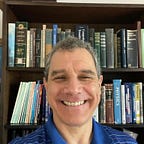The Race to Racism
Why do we hate so much?
All humans regardless of their station, culture, and creed are hardwired for selfishness. As a result, misanthropy born of competition and self-centered attitudes may be cultivated which has no regard for “other” people. However, we can ascribe qualities of ourselves to those born of us such as children. In other words, we are able to cherish them because they are a “part” of us. It is written by the Rabash (Concerning the Importance of Friends, Article 17, Part 1, 1984):
We can see that a person may see faults in his neighbor’s children, but not in his own. And when someone mentions some faults in his children, he immediately resists his friend and begins to declare his children’s merits.
And the question is, which is the truth? After all, there are merits to his children, and hence he is upset when others speak of his children. The thing is this, as I had heard it from my father: Indeed, each person has advantages and disadvantages. And both the neighbor and the father are saying the truth. But the neighbor does not treat the other’s children like a father to his children, since he does not have the same love for the children as the father does.
Hence, when he considers the other’s children, he sees only the children’s faults, since this gives him more pleasure. This is because he can show that he is more virtuous than the other because his own children are better. For this reason, he sees only the other’s faults. What he is seeing is true, but he sees only things he enjoys.
But the father, too, sees only the truth, except that he regards only the good things that his children have. He does not see his children’s faults, since it gives him no pleasure. Hence, he is saying the truth about what he sees in his children. And because he regards only the things that can please him, he sees only the virtues.
It turns out that if one has love of friends, the rule in love is that you want to see the friends’ merits and not their faults. Hence, if one sees some fault in one’s friend, it is not a sign that his friend is at fault, but that the seer is at fault, meaning that because his love of friends is flawed, he sees faults in his friend.
Thus, we face a critical juncture in our development as humans. Are we ready to reject the artificial differences we see in each other and embrace a common humanity and condition? Or will we continue to subscribe to “otherness” and propagate hatred, racism, ageism, sexism, and every other schism we can imagine? If we began to see everyone as part of us (brothers/sisters), can we deescalate our hatred to acceptance and escalate that acceptance to love? Imagine the world we could create[1]!
